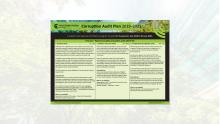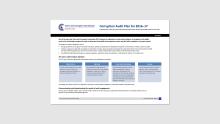The CCC conducts audits to examine how public sector agencies have responded to particular types of complaints about corruption and how robust their complaints management and prevention frameworks are. The audits are also aimed at controlling the risks of corruption.
To determine what audits the CCC will undertake, a corruption audit plan is prepared that describes the proposed program of audits. The audit plan is agile and audits can and will be reprioritised to ensure the plan incorporates emerging corruption risks identified and continues to be responsive to areas of public interest throughout the year.
Our Corruption Audit Plan - 2017 - 2019
Public reports
While not all CCC audit reports are made available to the public, summary audit reports may be produced to promote public confidence in the integrity of public administration. Our reports contain concise results of our findings and recommendations.
Below are the summary audit reports arising from the Corruption Audit Plan for the financial years 2017 - 2019.
 This audit reviewed whether agencies have been correctly assessing their complaints according to section 40 of the Crime and Corruption Act, which sets out how and when particular matters must be reported to the CCC. Based on the audit findings, the CCC published a step-by-step guide to help agencies correctly assess, classify and notify the CCC of corrupt conduct matters. Our guide emphasises the key steps, recordkeeping obligations and other supporting resources.
This audit reviewed whether agencies have been correctly assessing their complaints according to section 40 of the Crime and Corruption Act, which sets out how and when particular matters must be reported to the CCC. Based on the audit findings, the CCC published a step-by-step guide to help agencies correctly assess, classify and notify the CCC of corrupt conduct matters. Our guide emphasises the key steps, recordkeeping obligations and other supporting resources.
Note – Non-reportable matters are complaints of corrupt conduct that under section 40 of the CC Act may be dealt with by the agency without having to report them to the CCC.









